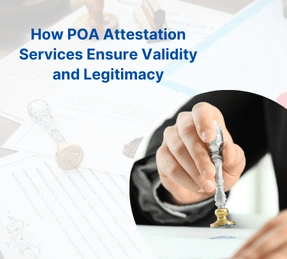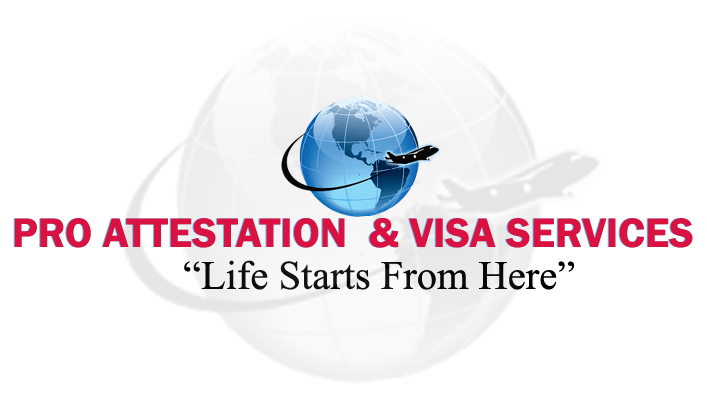
How POA Attestation Services Ensure Validity and Legitimacy
A Power of Attorney (POA) is generally associated with legal and official issues. But in the event that it has to be used in another nation, there would arise the need for POA attestation services that would help validate as well as authenticate the document. POA attestation refers to all verification processes that help legitimise a document with regard to its usage in other nations. This article will discuss the procedures involved in POA attestation, what the process constitutes, and which aspects are crucial for legalisation of the document.
What is POA Attestation?
POA attestation is the verification and legalisation process of a Power of Attorney document for acceptance in a foreign country. A Power of Attorney is a legal document issued by a person which grants someone the capacity to act on their behalf in matters of law and finance. To be recognised as legitimate across the borders, the document has to undergo the attestation process before various authorities in proof of its legitimacy.
Attestation ensures the document in question is valid and that the signatures on the POA are genuine. If at all the attestation is not done, foreign authorities can reject the POA, delaying and complicating things for you.
The Process of POA Attestation
The POA attestation process involves several steps to ensure the document’s authenticity. Each country has specific requirements for attestation, but the general process is as follows:
Steps Involved in POA Attestation
- Notarisation:The very first step through this process of attestation is to get the Power of Attorney notarised. For this purpose, a notary public verifies the identities of parties signing and ensures that they understand the contents of the document before signing it.
- State Authentication:After notarisation, the document has to be authenticated at the state level. This verifies that the notary's signature is authentic and sanctioned by the state.
- Ministry of External Affairs (MEA) Authentication: Once the document is authenticated at the state level, it is submitted to the Ministry of External Affairs (MEA) for further legalisation. The MEA verifies that the document complies with the legal requirements for use abroad.
- Embassy or Consulate Attestation: The final step is to obtain an attestation by the embassy or consulate of the country where the person proposes to visit. The embassy authenticates the legality of the document in the foreign country and puts an official stamp attestation on it.
Required Documents for Attestation
To initiate the POA attestation process, certain documents must be provided. These may include:
- Original Power of Attorney: The document to be attested.
- Identity proof of the person giving the POA: A passport or government-issued ID.
- Address proof of the person giving the POA: Utility bills, bank statements, or any government-issued document.
- Passport-sised photographs:Required in some cases, depending on the embassy.
- Notary Public’s certification:If the document has already been notarised.
Timeframe and Costs Associated with Attestation
The time taken for POA attestation can vary depending on the country and the specific embassy or consulate involved. In general, though, POA attestation can take up to 5 to 15 business days. Of course, other documents or steps might mean taking longer.
The cost of POA attestation varies with the destination country, the complexity of the process, and the number of steps. On the basis of urgency in the attestation process, different pricing tiers are offered by service providers, for which higher costs are attached to expedited services.
Key Concepts in Attestation and Legalisation
Some of the major concepts include attestation and legalisation that make a document genuine throughout the world.
Document Authentication
After A document authentication procedure is therefore meant to confirm the origin and authenticity of any document. This means that one confirms the validity of signatures and seals on paper, and that the document was issued with legal prescriptions in the country from which it originated.
Certificate Verification
This authentication process proves that the paper is issued by a registered authority like a notary or government official. Verification of certificates will guarantee that the source of that document would be recognised by the law in the destination country.
Notarisation
It is the authentication of people signing the paper with respect to their identities by a notary public. Notarisation is generally, the first process in attestation.
Public Documents and Government Authorities
Public documents are the authenticated paper issued by the government authorities. These include birth and marriage certificate and power of attorney documents. Such documents generally are needed to be attested before getting presented abroad for acceptance purposes.
Foreign Affairs Department and Ministry of External Affairs
Document authentication in most countries falls under the Ministry of External Affairs' purview. In the case of the MEA, documents will be properly legalised and should be in accordance with such international conventions as the Hague Convention.
The Role of Authentication Stamp
An authentication stamp is a crucial part of the attestation procedure. Such a stamp declares that the document is verified by the relevant authorities and is authentic. The stamp ensures that the document shall be lawfully used or accepted abroad by foreign entities.
Types of Documents Requiring Attestation and Legalisation
In addition to Power of Attorney documents, other types of documents that typically require attestation and legalisation include:
- Educational Certificates:Degrees, diplomas, and transcripts.
- Business Documents:Agreements, contracts, and commercial documents.
- Personal Documents:Birth certificates, marriage certificates, and divorce decrees.
Common Mistakes to Avoid in POA Attestation
Sometimes small errors create problems in attestation or delay the process. Therefore, one should be vigilant and avoid the following errors to ease the procedure:
Incomplete Documentation
Submission of incomplete or incorrect documents may delay the process. Make sure to double-check all required documents before submitting them for attestation.
Not Following Legal Procedures
Each country has specific legal procedures for attestation. Failing to follow these procedures can lead to the rejection of the document.
Ignoring Local Laws and Regulations
Every country has different attestation requirements. Due to this, if one does not comply with the local laws and regulations, then the document being used will be invalid.
Conclusion
POA attestation is a necessary step while sending the Power of Attorney document to other countries. The attestation process, which will include notarisation, state authentication, and finally embassy attestation, ensures that the document meets the legal standards and is well accepted by another country's authority. Knowing the steps involved in POA attestation process and avoiding common mistakes will smoothen the attestation process for anyone.
FAQ's of Procedure For Education Certificate Attestation
What must be done for an attestation to be valid?
The Notarisation, State Authentication, MEA Legalisation, and subsequently the attestation by the embassy or consulate will have to be performed upon the document for it to be valid.
Is it necessary to get an attested copy?
Yes, an attested copy is indeed required for using any documents internationally since it authenticates and makes it legitimate for foreign authorities to use the document as an official one.
What is the Difference Between the Apostille and Legalisation?
Apostille is easier legalisation for countries that are under the Hague Convention. Legalisation has a long, complex process for those countries that are not under the Hague Convention.
How to attest Power of Attorney in the Indian Embassy in Dubai?
You would need to obtain an original POA, notarised copies, and other such requirements like proof of identity and address for attestation at the Indian Embassy in Dubai. The embassy will authenticate the document based on Indian legal procedure.
Who signs an attestation?
It is signed by the authorised official from the Ministry of External Affairs or embassy/consulate of the country to which one is traveling. For that matter, it may also need an attestation of notary public at the very preliminary stages.




















 Chat Now
Chat Now